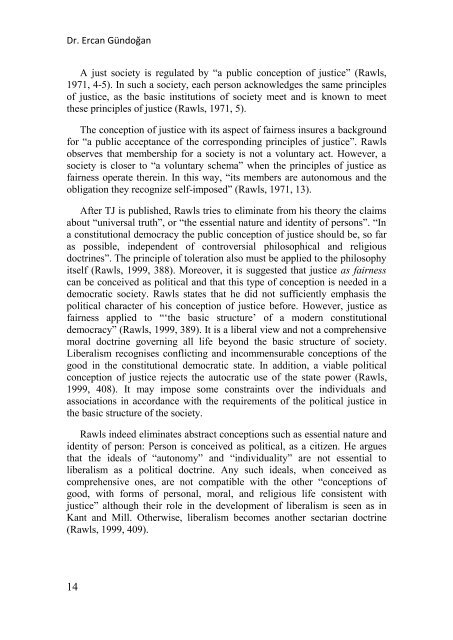SEEU Review vol. 5 Nr. 2 (pdf) - South East European University
SEEU Review vol. 5 Nr. 2 (pdf) - South East European University
SEEU Review vol. 5 Nr. 2 (pdf) - South East European University
Create successful ePaper yourself
Turn your PDF publications into a flip-book with our unique Google optimized e-Paper software.
Dr. Ercan Gündoğan<br />
A just society is regulated by “a public conception of justice” (Rawls,<br />
1971, 4-5). In such a society, each person acknowledges the same principles<br />
of justice, as the basic institutions of society meet and is known to meet<br />
these principles of justice (Rawls, 1971, 5).<br />
The conception of justice with its aspect of fairness insures a background<br />
for “a public acceptance of the corresponding principles of justice”. Rawls<br />
observes that membership for a society is not a <strong>vol</strong>untary act. However, a<br />
society is closer to “a <strong>vol</strong>untary schema” when the principles of justice as<br />
fairness operate therein. In this way, “its members are autonomous and the<br />
obligation they recognize self-imposed” (Rawls, 1971, 13).<br />
After TJ is published, Rawls tries to eliminate from his theory the claims<br />
about “universal truth”, or “the essential nature and identity of persons”. “In<br />
a constitutional democracy the public conception of justice should be, so far<br />
as possible, independent of controversial philosophical and religious<br />
doctrines”. The principle of toleration also must be applied to the philosophy<br />
itself (Rawls, 1999, 388). Moreover, it is suggested that justice as fairness<br />
can be conceived as political and that this type of conception is needed in a<br />
democratic society. Rawls states that he did not sufficiently emphasis the<br />
political character of his conception of justice before. However, justice as<br />
fairness applied to “‘the basic structure’ of a modern constitutional<br />
democracy” (Rawls, 1999, 389). It is a liberal view and not a comprehensive<br />
moral doctrine governing all life beyond the basic structure of society.<br />
Liberalism recognises conflicting and incommensurable conceptions of the<br />
good in the constitutional democratic state. In addition, a viable political<br />
conception of justice rejects the autocratic use of the state power (Rawls,<br />
1999, 408). It may impose some constraints over the individuals and<br />
associations in accordance with the requirements of the political justice in<br />
the basic structure of the society.<br />
Rawls indeed eliminates abstract conceptions such as essential nature and<br />
identity of person: Person is conceived as political, as a citizen. He argues<br />
that the ideals of “autonomy” and “individuality” are not essential to<br />
liberalism as a political doctrine. Any such ideals, when conceived as<br />
comprehensive ones, are not compatible with the other “conceptions of<br />
good, with forms of personal, moral, and religious life consistent with<br />
justice” although their role in the development of liberalism is seen as in<br />
Kant and Mill. Otherwise, liberalism becomes another sectarian doctrine<br />
(Rawls, 1999, 409).<br />
14

















